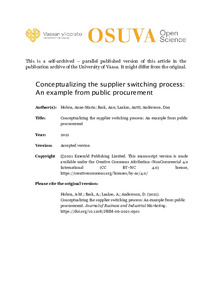Conceptualizing the supplier switching process: An example from public procurement
Holma, Anne-Maria; Bask, Anu; Laakso, Antti; Andersson, Dan (2021-11-19)
Holma, Anne-Maria
Bask, Anu
Laakso, Antti
Andersson, Dan
Emerald
19.11.2021
Julkaisun pysyvä osoite on
https://urn.fi/URN:NBN:fi-fe2022031423422
https://urn.fi/URN:NBN:fi-fe2022031423422
Kuvaus
vertaisarvioitu
©2021 Emerald Publishing Limited. This manuscript version is made available under the Creative Commons Attribution–NonCommercial 4.0 International (CC BY–NC 4.0) license, https://creativecommons.org/licenses/by-nc/4.0/
©2021 Emerald Publishing Limited. This manuscript version is made available under the Creative Commons Attribution–NonCommercial 4.0 International (CC BY–NC 4.0) license, https://creativecommons.org/licenses/by-nc/4.0/
Tiivistelmä
Purpose
This paper aims to develop a framework for switching a service supplier in a supply network.
Design/methodology/approach
The study builds on existing literature in the field of purchasing and supply management, public procurement (PP) and the Industrial Marketing and Purchasing approach, as well as on an illustrative example case, from the PP context, of a supplier switch in a service delivery process.
Findings
During a switching process, the buyer must simultaneously manage the ending of a relationship with the incumbent supplier and the beginning of a relationship with a new supplier. Collaboration with the focal suppliers to develop a service process with standardized components prevents disruptions in the service processes and reduces the impact of the switch on the wider network.
Research limitations/implications
The conceptualization suggested in this paper needs to be further explored in different empirical contexts to assess its practical adequacy.
Practical implications
Practitioners responsible for service procurement can use the findings to develop collaboration with suppliers, both when it comes to service process development and to the switching process. Furthermore, the authors highlight the importance of ending competencies and the development of an exit plan to conduct a “beautiful exit.”
Originality/value
The paper integrates relationship initiation and ending studies, as well as procurement process models to develop a refined switching process framework. Many PPs rely on short-term relationships due to the legal obligation to frequently invite suppliers to tender, thus understanding the supplier switching process is important both for private and public sector actors.
This paper aims to develop a framework for switching a service supplier in a supply network.
Design/methodology/approach
The study builds on existing literature in the field of purchasing and supply management, public procurement (PP) and the Industrial Marketing and Purchasing approach, as well as on an illustrative example case, from the PP context, of a supplier switch in a service delivery process.
Findings
During a switching process, the buyer must simultaneously manage the ending of a relationship with the incumbent supplier and the beginning of a relationship with a new supplier. Collaboration with the focal suppliers to develop a service process with standardized components prevents disruptions in the service processes and reduces the impact of the switch on the wider network.
Research limitations/implications
The conceptualization suggested in this paper needs to be further explored in different empirical contexts to assess its practical adequacy.
Practical implications
Practitioners responsible for service procurement can use the findings to develop collaboration with suppliers, both when it comes to service process development and to the switching process. Furthermore, the authors highlight the importance of ending competencies and the development of an exit plan to conduct a “beautiful exit.”
Originality/value
The paper integrates relationship initiation and ending studies, as well as procurement process models to develop a refined switching process framework. Many PPs rely on short-term relationships due to the legal obligation to frequently invite suppliers to tender, thus understanding the supplier switching process is important both for private and public sector actors.
Kokoelmat
- Artikkelit [2620]
